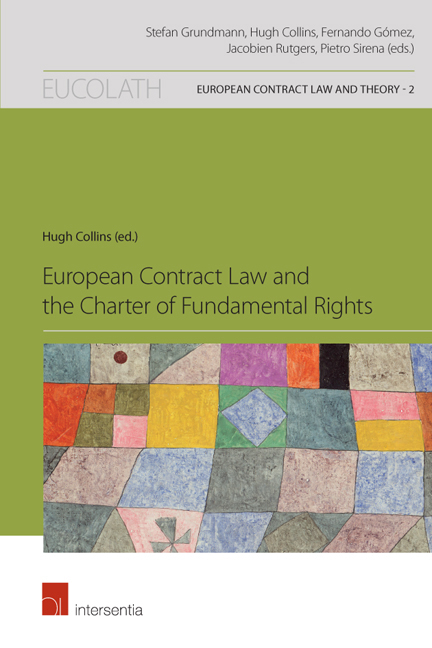Book contents
- Frontmatter
- Contents
- Table of Cases
- List of Authors
- Building European Contract Law on Charter Rights
- How Autonomous Should Private Law Be? Elements of a Private Law Constitution
- The Constitutional Transformation of Private Law Pillars through the CJEU
- Fundamental Rights before the Court of Justice of the European Union: A Social, Market-Functional or Pluralistic Paradigm?
- Minimum Harmonisation and Article 16 of the CFREU: Difficult Times Ahead for Social Legislation?
- The Right to Housing (Article 7 of the Charter) and Unfair Terms in General Conditions
- The EU Charter of Fundamental Rights and Consumer Credit: Towards Responsible Lending?
- The Justice Dimensions of the Relationship between Fundamental Rights and Private Law
- Discrimination and the Self-Employed: The Scope of Protection in an Interconnected Age
- The Effects of Fundamental Rights in Private Disputes
- Responsible Contracting: The Requirements of EU Fundamental Rights on Private Law Regimes
- Index
The Justice Dimensions of the Relationship between Fundamental Rights and Private Law
Published online by Cambridge University Press: 22 September 2018
- Frontmatter
- Contents
- Table of Cases
- List of Authors
- Building European Contract Law on Charter Rights
- How Autonomous Should Private Law Be? Elements of a Private Law Constitution
- The Constitutional Transformation of Private Law Pillars through the CJEU
- Fundamental Rights before the Court of Justice of the European Union: A Social, Market-Functional or Pluralistic Paradigm?
- Minimum Harmonisation and Article 16 of the CFREU: Difficult Times Ahead for Social Legislation?
- The Right to Housing (Article 7 of the Charter) and Unfair Terms in General Conditions
- The EU Charter of Fundamental Rights and Consumer Credit: Towards Responsible Lending?
- The Justice Dimensions of the Relationship between Fundamental Rights and Private Law
- Discrimination and the Self-Employed: The Scope of Protection in an Interconnected Age
- The Effects of Fundamental Rights in Private Disputes
- Responsible Contracting: The Requirements of EU Fundamental Rights on Private Law Regimes
- Index
Summary
INTRODUCTION
Does a private limited company have a fundamental right freely to conduct a business? Article 16 of the Charter of Fundamental Rights of the European Union (CFREU) proclaims that ‘[t]he freedom to conduct a business in accordance with Union law and national laws and practices is recognised ’. The Charter speaks of a ‘freedom ’that is ‘recognised ’(by the EU, presumably). However, in the recent Alemo-Herron case, the Court of Justice of the European Union (CJEU) referred to this freedom as a ‘fundamental right ’. The turn of phrase may have been due to a slip of the pen, but the Court's use of language may also have been deliberate. This raises the question of what exactly it would mean to have a fundamental right to conduct a business. Would it be a human right? Human rights are rights that we all have as human beings, i.e. by virtue of our humanity. However, in Alemo-Herron, the presumed right-holder was not a natural person but Parkwood Leisure Ltd, a private limited company. Perhaps the shareholders in the company may be the ones who hold the fundamental right to conduct a business, but that does not seem to be what the Court had in mind and, in any case, the shareholders were not a party to the dispute.
If Article 16 were indeed to confer a right, then the next question would be: a right to what and against whom? For, when someone has a fundamental right – or indeed any right – that person is entitled to something against someone. So, against whom do we have a right to conduct a business and what is the content of that right? In other words, who is under a duty to do or abstain from doing what towards the right holder? Alemo-Herron was a case about the interpretation of a directive on the safeguarding of employees ‘rights in the event of a transfer of a business. According to the Court, the ‘fundamental right’ to conduct a business ‘covers, inter alia, freedom of contract’.
- Type
- Chapter
- Information
- European Contract Law and the Charter of Fundamental Rights , pp. 167 - 196Publisher: IntersentiaPrint publication year: 2017
- 2
- Cited by



